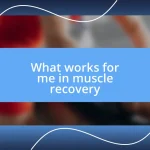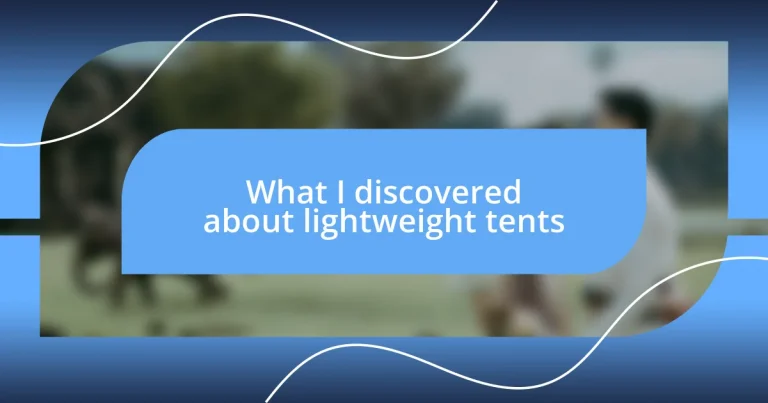Key takeaways:
- Lightweight tents significantly enhance outdoor experiences by improving portability, efficiency, and comfort, allowing adventurers to enjoy longer treks with less fatigue.
- Key features to consider when selecting a lightweight tent include weight, weather resistance, and ventilation to ensure a pleasant and dry camping experience.
- Notable brands like Big Agnes, MSR, and Nemo offer high-quality lightweight tents that combine durability with innovative designs, enhancing both functionality and user experience.
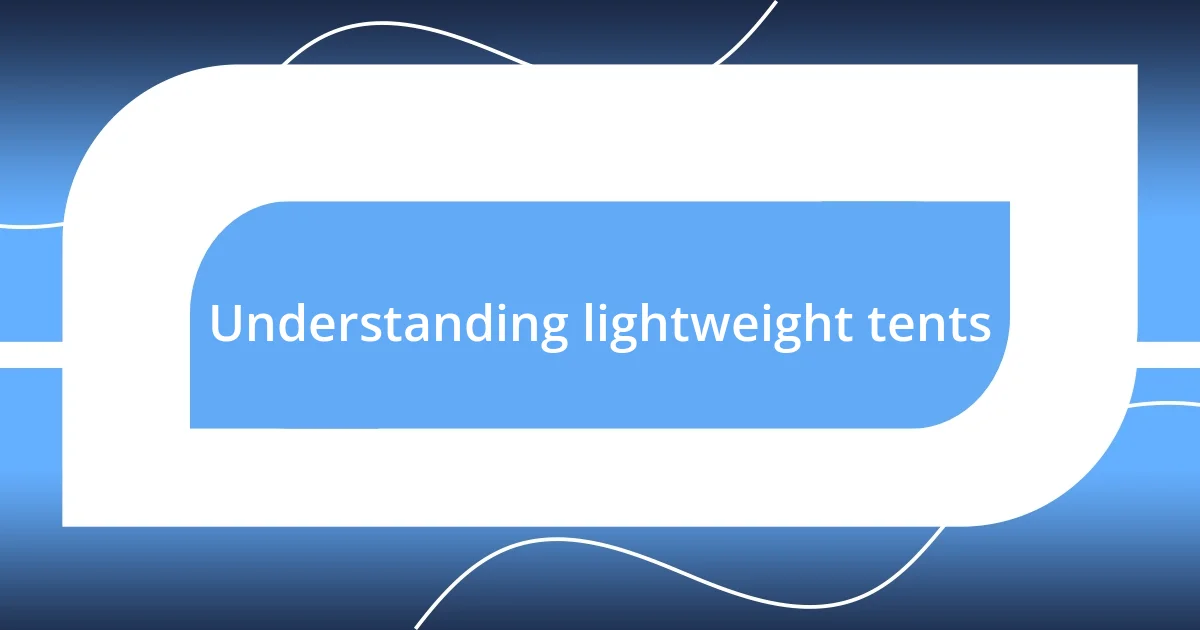
Understanding lightweight tents
Lightweight tents are designed for outdoor enthusiasts seeking to minimize their pack weight without sacrificing comfort. I still remember my first backpacking trip with a bulky tent—it felt like I was carrying a small car! The moment I swapped it for a lightweight version, I truly grasped the importance of weight in my gear selection. Isn’t it amazing how a few extra pounds can change the entire experience?
These tents typically utilize high-tech materials like ripstop nylon and silicon-coated fabrics, which help reduce weight while maintaining durability. When I first unrolled my lightweight tent, I was surprised by how fragile it looked compared to my old one, but it held up against harsh winds and pouring rain. Have you ever wondered how something so light can offer so much protection?
Understanding the weight-to-strength ratio is crucial. It’s not just about choosing the lightest option but finding the perfect balance to meet your adventure needs. I recall a challenging hike where a lightweight tent made all the difference—setting up camp was a breeze, and it felt great not to be bogged down after a long day on the trail. What experiences have you had that shaped your thoughts on lightweight gear?
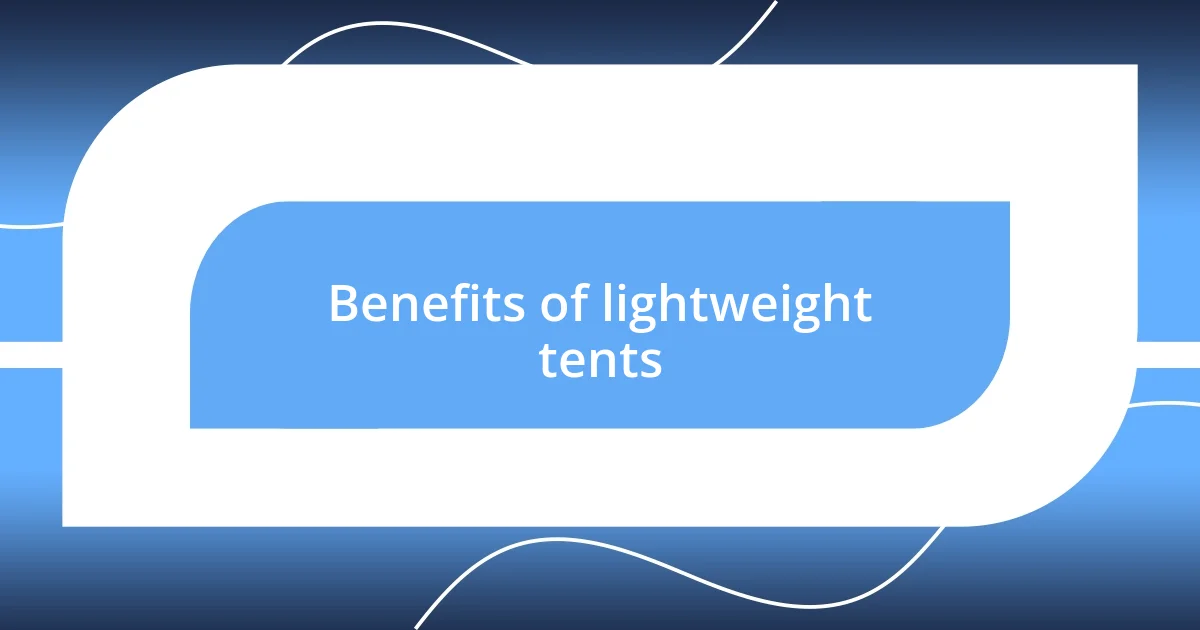
Benefits of lightweight tents
While using lightweight tents, I’ve discovered a simpler, more enjoyable experience in the great outdoors. The reduced weight not only increases my agility on longer treks but also enhances my overall enjoyment of the journey. It’s incredible how cutting down on gear makes everything feel more liberating, almost like a weight has been lifted—not just from my pack, but from my mind.
Here are some key benefits of lightweight tents that I’ve genuinely come to appreciate:
- Easier Portability: Moving from campsite to campsite becomes less of a chore, allowing me to explore more.
- Time Efficiency: Setting up a lightweight tent is a breeze—fewer poles and lighter materials mean quicker setups, giving me more time to relax and enjoy nature.
- Improved Comfort: Not lugging around extra weight helps me maintain my energy levels, leading to more restful nights under the stars.
- Versatility: With their lightweight nature, these tents can adapt to various terrains and adventures, from alpine hikes to forest trails.
I vividly recall a time when I hiked up a steep trail and that lightweight tent made all the difference. My legs were already tired, and the last thing I wanted was to struggle with a cumbersome setup. I found myself chuckling as my friends struggled with their heavier gear while I breezed through my own setup in mere minutes. It was in that moment I truly understood how valuable these lightweight options are in enhancing our outdoor pursuits.

Key features to consider
When selecting a lightweight tent, several key features demand your attention. First and foremost is the tent’s weight itself. I remember my excitement when I found a tent weighing under three pounds; it reshaped my whole approach to camping. A lightweight structure allows you to travel farther without the burden of heavier materials slowing you down. Does it seem impossible to balance weight with durability? With the right materials and design, you can achieve both.
Another critical feature is the tent’s weather resistance. I once camped in a sudden storm, and my lightweight tent stood firm against the elements, leaving me amazed at its performance. Look for tents with waterproof coatings and reliable seams to ensure you remain dry, regardless of the conditions outside. Trust me, nothing beats the feeling of knowing you’re protected while listening to the rain patter on the fabric.
Ventilation is also paramount in preventing condensation. I learned this the hard way during a humid night when I woke up to a damp interior. Lightweight tents often come with specialized vents or mesh panels that maintain airflow while keeping insects out. The right ventilation can make your camping experience significantly more pleasant, allowing for good sleep and comfort.
| Feature | Importance |
|---|---|
| Weight | Less weight means easier transport and greater mobility. |
| Weather Resistance | Provides protection against the elements, ensuring a dry experience. |
| Ventilation | Prevents condensation, contributing to a more comfortable sleep. |
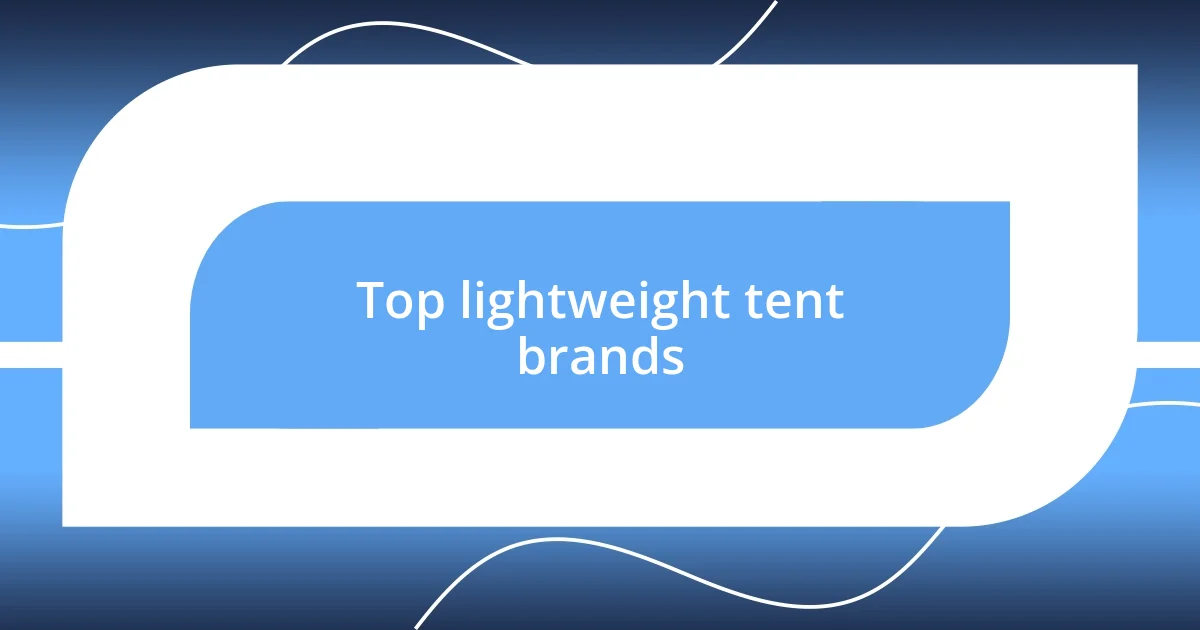
Top lightweight tent brands
When it comes to top lightweight tent brands, I can’t help but highlight Big Agnes. Their tents have consistently impressed me with their balance of weight and durability. A few years back, I hiked the Pacific Crest Trail, and it was my Big Agnes Fly Creek that accompanied me every step of the way. I remember how effortlessly it tucked away in my pack, making those long miles more manageable.
Another strong contender is MSR (Mountain Safety Research). I had my first encounter with an MSR tent during a rainy backpacking trip in the mountains. The lightweight Hubba NX not only survived being bathed in rain but also performed remarkably well. I loved the space it offered and appreciated how quick the setup was, especially since the weather kept changing from drizzle to downpour. It was a relief to have a tent I could rely on in those unpredictable conditions.
Lastly, I have to mention Nemo. Their Hornet series caught my attention for its striking design and user-friendly features. I recall setting it up in a vibrant campsite filled with fellow adventurers, and I felt a sense of pride to have such a stylish and functional tent. The thoughtful details, like the dual doors and vestibules, made sharing the space with a friend feel comfortable. Isn’t it amazing how the right gear can enhance our outdoor experiences, nurturing a deep connection with both nature and our companions?
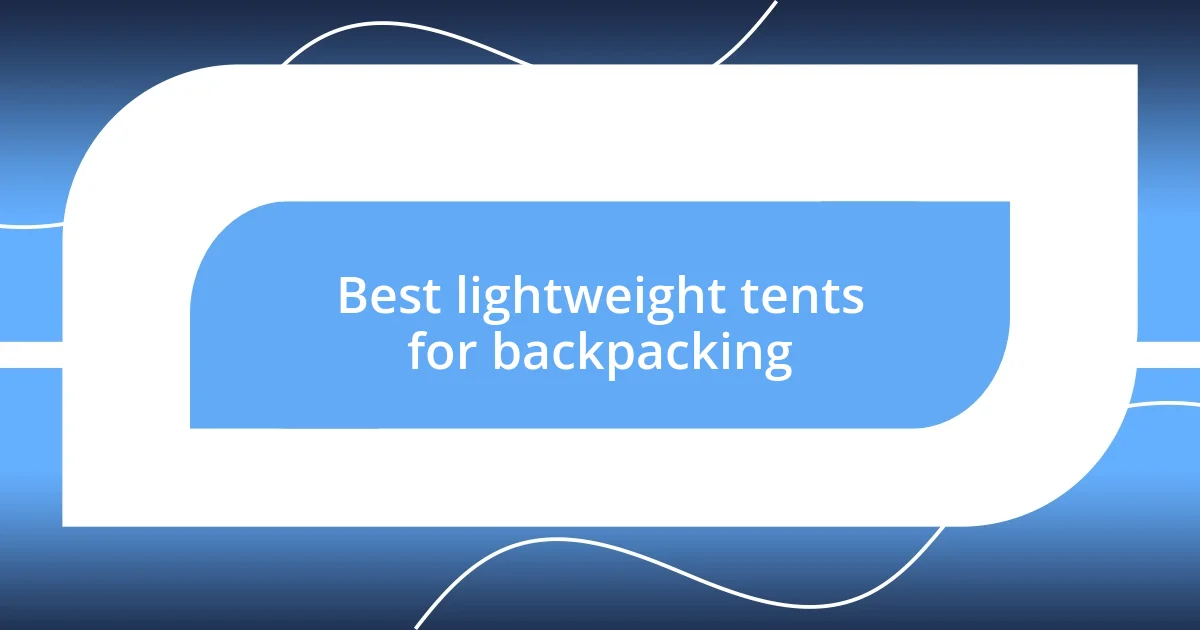
Best lightweight tents for backpacking
I’ve had my fair share of adventures, and I have to say, the Big Agnes Copper Spur HVUL stands tall among the best lightweight tents for backpacking. I remember the first night I camped under the stars with it; the setup was so quick that I had more time to enjoy the campfire with my friends. This tent combines a low weight with spaciousness, and it has a unique design that gives you an incredible headroom. That rush of stepping into a tent that feels like home is simply exhilarating.
Another excellent choice is the REI Co-op Quarter Dome SL. On a recent trip to the Appalachian Trail, I was blown away by how this tent held up against unexpected winds. It’s astonishing to think about how such a lightweight design can provide such stability and comfort. I also loved the rainfly, which made me feel secure while I drifted off to sleep, listening to the gentle rustling of leaves outside. I still get a little nostalgic thinking about those peaceful moments, knowing that my shelter had me covered.
Lastly, I can’t help but rave about the Naturehike Cloud-UP. It’s not just a testament to clever design; it’s a reminder of the adventures we chase. During a solo trek, I set it up in a quiet, remote area, and I truly felt at one with nature. The vibrant colors and unique shape distinguished it from others at the campsite, sparking conversations with fellow hikers. Isn’t it wonderful how a simple tent can lead to unexpected connections with like-minded adventurers? That’s the magic of choosing the right gear!

